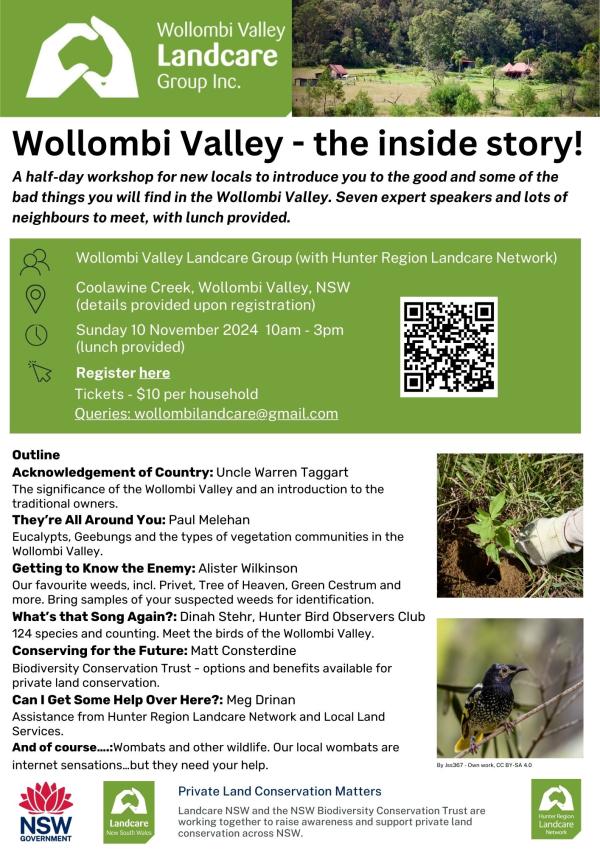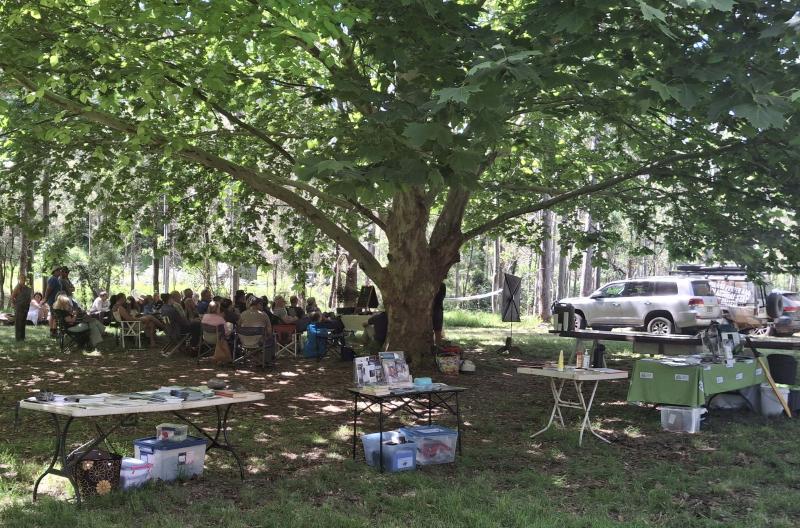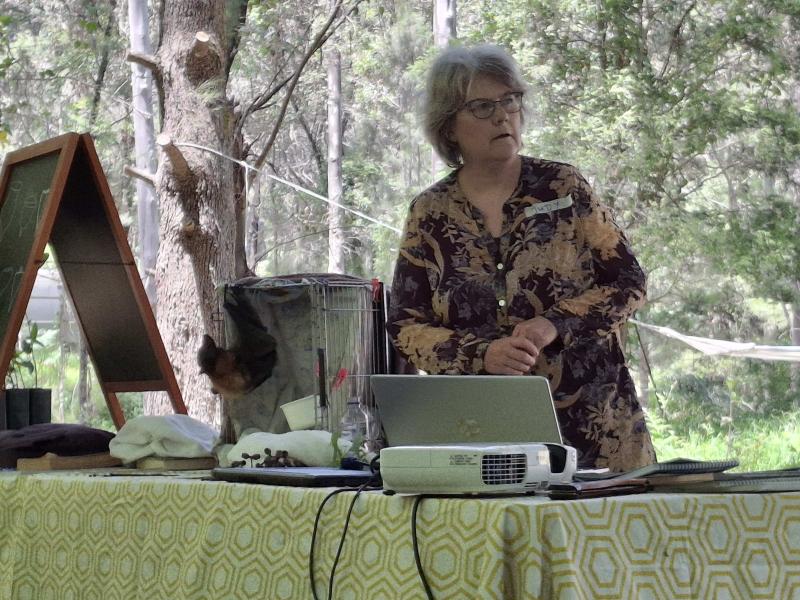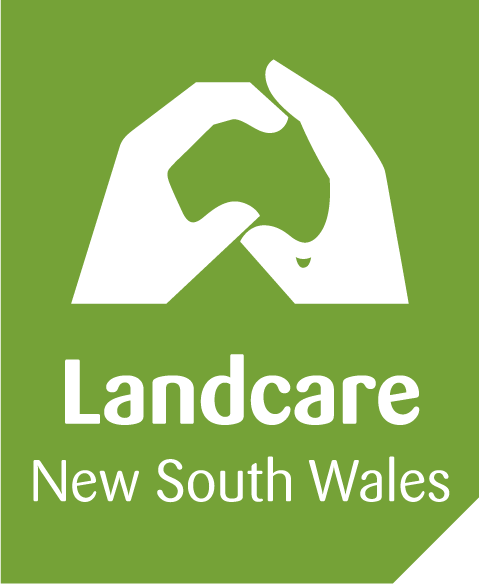Event Type
Landcare Region
BCT Region
Lower Hunter - Cessnock LGA-Aunty Leanne King, Hunter Bird Observers Club, HRLN,
Wollombi Valley Landcare and Hunter Region Landcare Network presents a day of connecting with other locals and learning about the environment with walk and talks by:
- Uncle Warren Taggart - welcome the valley residents and talk about its ancient history and the peoples from there, cultural burning.
- Wombats and other wildlife need our help - tbc.
- Paul Melehan- Eucalypts, and the types of vegetation communities found in the Wollombi Valley.
- Alistair Wilkinson- common weed identification including Privet, ToH, Green Cestrum and more
- Dinah Stehr- Birds of the Wollombi Valley, walk along Coolawine Creek.
- Rye Gollan- Biodiversity Conservation Trust- options available for private land conservation.
- Meg Drinan- How HRLN and LLS can assist land managers with their integration into the environment of the valley.
The venue details will be supplied upon booking. The location is near Coolawine Creek.
This event is sponsored by the Private Land Conservation Matters Program, a joint initiative of the Biodiversity Conservation Trust and Landcare NSW. Morning Tea and Lunch are included in the workshop.
Please register by 03 November. 9.45am arrival for 10.00am-3.00pm.
Event Topics



Event Outcomes
Growth in learning measure (Scale 1 - 100)
The famous Wollombi Landcare group has recently held a very successful Wollombi Valley – The Inside Story! landholder workshop, courtesy of the Biodiversity Conservation Trust and HRLN. The day was jam-packed full of riveting guest speakers, leaving the 50 + attendees motivated and inspired to continue their hard work in the glorious Wollombi Valley.
Uncle Warren Taggart led the day with a Welcome to Country, followed by our own Upper Hunter Coordinator Paul Melehan, who provided invaluable Eucalypt and weed identification techniques. The Hunter Bird Observers Club was represented by Dinah Stehr and Miranda Moore, who could virtually charm the very birds from the trees, nominating the many ways to attract and provide shelter and habitat for the local avian population, and tips and tricks on bird call identification. Judy Hopper of Hunter Wildlife Rescue taught a myriad of skills including treating wombats for mange and how to deal with the dreadful side-of-the- road wildlife injuries.
After a delicious lunch, the day was wrapped up with landholders getting the scoop on the Biodiversity Conservation Trust agreements available, and Mid Hunter Coordinator Meg Drinan informed everyone on the lurks and perks of joining Landcare. Anyone interested in joining this dynamic group, please contact: wollombi.landcare@gmail.com or check them out online at: https://www.wollombilandcare.org.au/
Wollombi Workshop Feedback Report
1. Introduction
The Wollombi Workshop was well received by attendees, with positive feedback on the organisation, location, and range of topics covered. Participants appreciated the expertise of the presenters, opportunities for networking, and engaging discussions. This report collates feedback by key themes, highlighting areas of success and suggestions for improvement.
2. Key Strengths
2.1 Organisation & Venue
- The event was well-organised and smoothly run.
- The outdoor setting under a shady tree provided a comfortable learning environment.
- The venue was beautiful and well-suited to the workshop.
2.2 Presenters & Topics
- Attendees enjoyed the diverse mix of knowledgeable and generous presenters.
- The range of topics covered provided a broad and informative experience.
- Q&A sessions were engaging and beneficial for participants.
2.3 Community & Networking
- The event fostered connections between like-minded individuals.
- Participants valued meeting experts familiar with the local environment, including wildlife, trees, and birds.
- The presence of local wildlife rescue representatives added to the experience.
2.4 Catering & Additional Perks
- The catering, particularly the curry puffs, was highly appreciated.
- Attendees enjoyed the relaxed and immersive feel of the workshop.
3. Areas for Further Learning
Participants expressed interest in the following topics for future workshops:
3.1 Weeds & Land Management
- Identification and control of invasive weeds.
- Practical techniques for bush regeneration and conservation.
- Strategies for managing weeds on personal properties.
3.2 Wildlife & Habitat Restoration
- Best practices for attracting and supporting koalas.
- Creating natural water sources such as billabongs for wildlife.
3.3 Broader Topics
- Endangered species identification.
- Soil improvement strategies.
- Native plant propagation and seedling growth.
- Water retention and harvesting techniques.
- Small-scale crop cultivation, including garlic and medicinal plants.
4. Suggestions for Improvement
4.1 Event Logistics
- Improve time management by ensuring presentations run within their allocated times.
- Enhance screen visibility to make presentations easier to follow.
- Improve audio clarity to ensure all attendees can hear presenters.
4.2 Resources & Materials
- Provide PDF versions of booklets and presentations.
- Offer printed handouts where feasible.
- Make specific resources, such as the Singleton Tree PDF, accessible to participants.
4.3 Future Workshop Ideas
- A dedicated session on weed management, potentially as a separate or online workshop.
- More focus on soil improvement, water retention, and native plant propagation.
5. Conclusion
Overall, the Wollombi Workshop was highly regarded for its informative content, engaging presenters, and well-organised structure. Attendees appreciated the opportunity to learn, connect, and discuss key environmental topics. Moving forward, addressing logistical improvements and expanding on specific areas of interest will enhance the experience for future participants.
